Sponsored by Princecraft
Written by Pete Bowman, in collaboration with Angelo Viola, Ray Kohlruss, Ryan Flaro, Gord Pyzer & Steve Niedzwiecki
In this article, I have decided to give you some of my opening day tricks and tactics that I have learned throughout my many years on the water. And as a first-of-the-fishing-season bonus, I have reached out for some other expert opinions to round out my top-ten list and hopefully help you through this often-trying time.
The first 5 tips are from yours truly.
The remainder are from 5 esteemed guests that I have reached out to, so as “we” (yup me too) can all learn from true fishing experts. This list consists of fishing professionals/celebrities Angelo Viola, Gord Pyzer, TV personality/guide/fishing lodge owner Steve Niedzwiecki as well as professional fishing guides Ryan Flaro and Ray Kohlruss, all writing in their expert opinions on specific species. Opening day fishing can be tricky, however these guys just may help you through.
BTW, the reason I have not said for what fish is because I do not just want to pigeon-hole this towards a single species. This one will encompass several different fish.
Hope you enjoy and learn something in the process!
PART 1 – MY TOP 5 OPENING DAY FISHING TACTICS
STEELHEAD/RAINBOW TROUT
#01 My Opening Day Steelhead Tip: In my neck of the woods in Ontario, this is usually the first official “opening day” of the fishing season. Aside from the 2020 opener in where Covid had shut down access to many rivers, this is an opening day extravaganza like no other. There is no need for a boat/motor/trailer combo, just a set of waders. It’s a time when everybody is raring to get their lines wet.
We all know or should by now know that spawn or roe is probably the best bait used by Steelhead anglers in creeks and rivers. After all, it has produced numerous fish across the country. But every good Steelheader out there would not be caught along a river without a backup of some type.
I used to live in Port Hope and my place was less than a kilometer from the Ganaraska River. Many times, and I mean many, I would drift an earthworm through a current break and many times I was rewarded with a fish. A live worm, either drifted under a float rig or with a single splitshot and hook can be such a deadly tactic especially in the afternoon portion of opening Trout season. Try to bring some nice skinny little “finesse” worms along with some of those beauties that you would drag for Walleye.
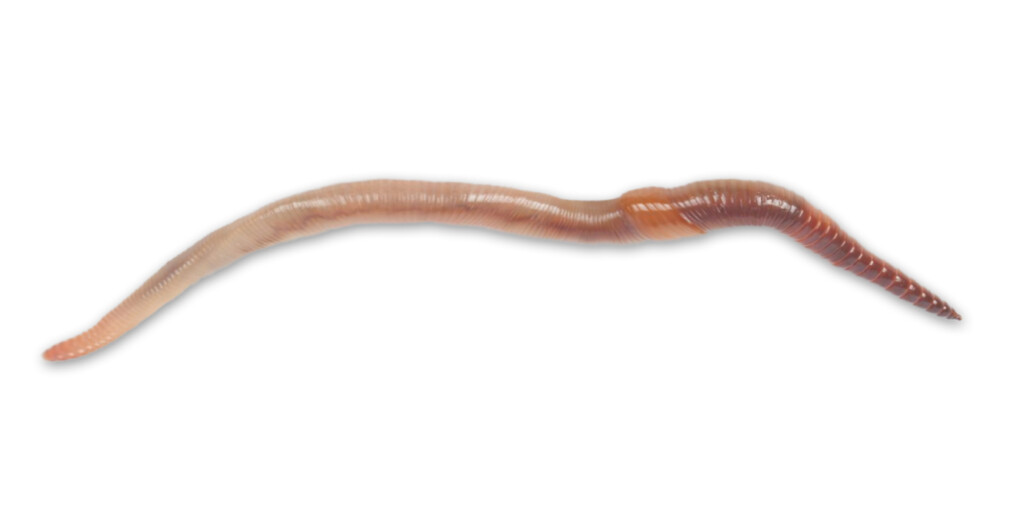
Simply put, worms are deadly on a multitude of species
WALLEYE
#02 My Opening Day Walleye Tip: Opening day Walleye fishing can be a bit tricky at times. It all depends on the progression of the fish since they have spawned. If it was a cold, drawn-out winter to spring progression, the Walleye bite might be a bit behind their normal schedule. If it was a warm, fast movement to spring, things might be well on the way to that first massive feeding binge put on by these often-elusive creatures.
One of my all-time favourite opener Walleye techniques is pulling either a worm harness or a live bait rig both tipped with a night crawler.
For the harness, I like a single blade in either silver, gold or chartreuse ahead of a 2-hook setup. That blade us usually a #1-3, Colorado style however I may vary that up to a hatchet style if I need to slow down. I normally pull these near the bottom with a bottom bouncer however if I see suspended fish, I will stack some split shots or a small, rubber core sinker ahead of my rig and drift or troll for suspended fish.
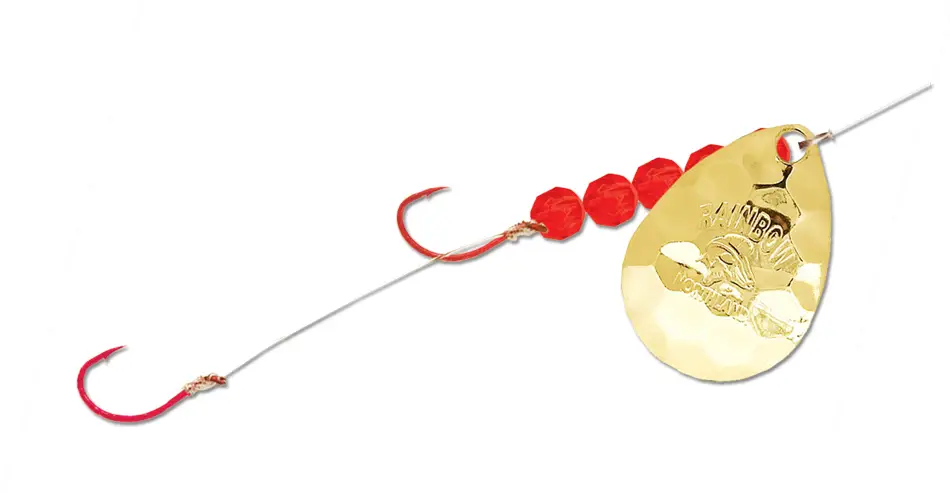
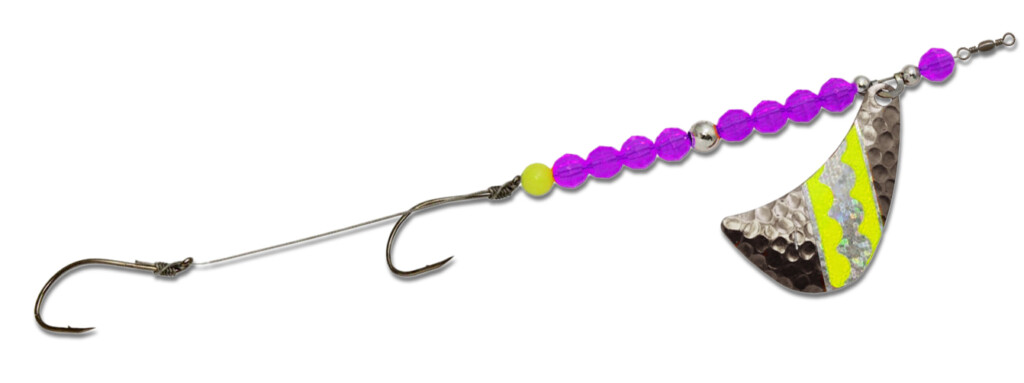
The top image is a 2-hook worm harness with a gold Colorado blade. This will work on almost any lake. The lower image is another harness with a Hatchet blade. That little beauty will spin when most others won’t. Add a full nightcrawler to either of these to conquer a tough opening-day Walleye bite
For my live bait rig, I dictate the sinker size to the depth of the water. Shallow = light, deep = heavy. I normally do not use an inline floater but occasionally (if emergent weeds exist in the area) I will. On the opener again I drag a nice big nightcrawler.

IMPORTANT RULE OF THUMB: If you are fishing an area that has lots of Yellow Perch or other types of panfish, these 2 tactics may not be feasible since your worms will get constantly robbed and picked apart.
PIKE
#03 My Opening Pike Tip:
Northern Pike are a funny creature. With all those razor-sharp teeth and a perceived attitude of a wild boar, one would think that if it swims, Pike will eat it. Maybe so in mid-season, however early in the year, things can be different. I’ve seen many a “big fish” presentation ignored while some crazy little whatever bait knocks em’ dead.
This opening day tactic has all southern parts of Canada included in where Pike reside. Many people think that Pike must be gigantic to be worthwhile. I disagree. On any Pike opener, with the coldish water around, I love fishing for the table. That means that I’m after 5-8 pounders. Not your typical giant. That said, if I am way up north, let me at the 40+ inchers, because there is no denying, they are fun.
As for eaters as well as giants, my opening day go to baits are a gold 5” suspending jerkbait, a 4” swimbait and a bare (no dressing on the hook) in-line spinner from #3-#5.
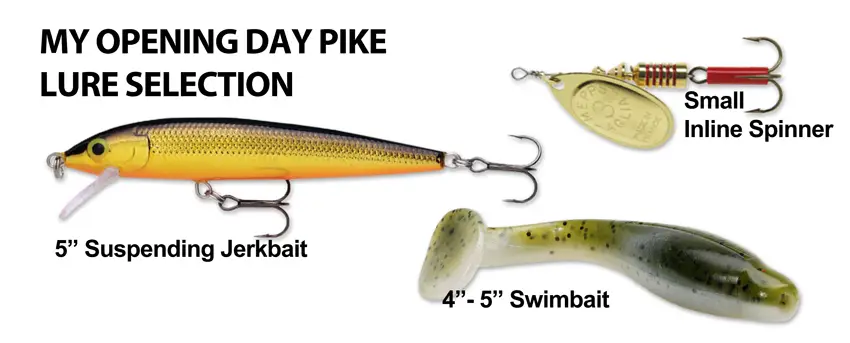
I can pretty much guarantee you that one of these 3 baits are going to work for you on opening day. I was going to include a spoon, but you will see below, one of our guide friends has that on his list.
Work that jerkbait in nice long slow sweeps with 2-3 second pauses.
Swim the swimbait back on a medium steady retrieve, only adding in subtle changes with the rod tip.
Reel that little spinner back, again at a medium pace and stop reeling every now and then but only for a brief-moment.
LARGEMOUTH BASS
#04 My Opening Day Largemouth Tip:
I recently put out a piece on squarebill crankbaits and just how effective they are on Largemouth. One of the images in that piece had Ben Gleeson holding up a 6lb-plus Canadian Largemouth that he caught on an opening Bass day while fishing with myself and his dad Sean. That fish inhaled a squarebill. That squarebill was a 2.5 size. Ben caught a few fish that day on his 2.5, and most of them were quality-sized. If you experience a nice warm spring and have the feeling that the Largemouth spawn is well over with, that larger-sized squarebill is a great trick for a few big bites (in my experience, a 1.5 smaller model often gets more bites early in the Bass season). The best tip I can give you here is to experiment with speeds. Barely crawl it in the morning and by mid-day, rip it, bump it, smash it & crash it!
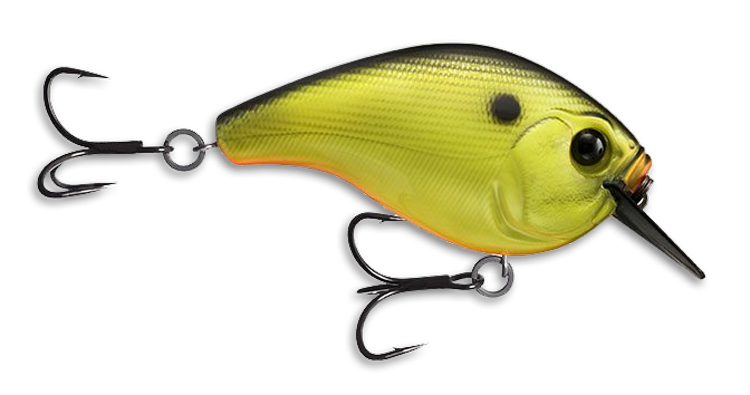
Squarebill Crankbaits… I cannot say enough about them.
Another opening Largemouth bait I recommend is a 4” soft stick worm like a Yamamoto Senko. Even though a 5 or even 6-inch bait will work on the opener, you would be amazed at not only how many bites you’ll get with a 4” but you truly have as much chance at a Hawg as you do with the larger sizes. That big yap sucks it right in!
I normally rig them weedless/Texposed style with a 3/0 wide gapped worm hook. I do not use the Superline (extra strong) hooks here even if I’m using braid.
For open water or weed flats I will use 10-12lb fluorocarbon line (or even monofilament) on a baitcast rig, if I’m fishing docks or pads etc., I’ll use 20lb straight braid (no leader material) on a spinning rig. A 6.5’ medium action rod will get the job done.
SMALLMOUTH BASS
#05 My Opening Day Smallmouth Tip: I normally save the Bass opener for Largemouth, however I love early Smallie fishing since they are shallow and ready to put on the MMA gloves (or drop the hockey gloves, whichever you prefer).
Depending on the area you are fishing, Smallmouth Bass on the opener are a species of fish that can be in various stages. For example, a small lake near the city of Kingston Ontario may have fish that have spawned out weeks prior, yet the Smallmouth on Lake Ontario, which could be as close as 20-40km away, are still sitting on nests. Thankfully the Ontario MNRF has changed the Smallie opener on Lake Ontario (FMZ 20) to allow the fish to finish their duties. Be aware, there are now a few Bass openers in southern Ontario. Always check your regs.
Smallmouth Bass are an aggressive beast… that’s for sure. The rigors of spawning have certainly taken their toll on both the males and females but by the opener, both are ready to eat. The females are well done with their dropping of the eggs and the males are now done guarding their young. They’re hungry and it’s chow time…
On the opening day morning (and throughout the season), I will always have a Ned rig tied on. This is a finesse bait that has been making huge waves in recent years for both Smallmouth and Largemouth.
Although Ned Kehde came up with this rig for “numbers of Largemouth”, it has proven to be a deadly bait for big Smallies as well. When I was out last year in Lake Ontario, although it was not on opening day, it was early in the season and Ned rigs played an important role for our great sack of fish. As for colors, pumpkin green always works and Z Man’s “The Deal” is another good one. Try and use as light a weight jig-head as possible.
If you were armed with a Ned rig along with a dropshot rig, you would have a great arsenal of plastic bait Smallmouth weaponry.
So, there you go. Those were my Top 5 Opening day suggestions. The remainder are from my guest list:
PART 2 – TOP 5 OPENING DAY FISHING TACTICS FROM 5 PROFESSIONAL ANGLERS
ANGLER – ANGELO VIOLA, species BROOK TROUT
Like most trout species, come opening day and Brook Trout are set up and raring to eat. Remember that Brookies spawn in the fall so if they indeed did spawn, that stress has been over for months (Rainbow/Steelhead spawn in the spring). In fact, of the fish on this list, the Brook Trout is the only fall spawner. This also means it is the least worn-out of the bunch… lots of hunger, spunk, and power!
Ang has put as much time as anyone out there when it comes to opening day Brook Trout fishing in the Algonquin Park interior. Through those many years of opener after opener, I asked him if he could only use “one” tactic for that first day of Brookie fishing, what would it be?
#06 Angelo’s Opening Day Brook Trout Tip:
Hands down my all-time favorite opening day species is Speckled Trout more commonly referred to as Brookies. For the first 20 years of my adult life, I spent every trout opening week somewhere in the bowels of Algonquin Park, one of the last bastions for wild speckled trout on planet earth. Over those years I portaged hundreds of miles and thousands of paddle strokes to get to hidden little lakes that are scattered throughout the Algonquin outback. Each one different from the other, but one thing remained the same season after season, my choice of lures.
Without question, the most productive bait you can use for specks in the spring of the year are EGB spoons or “Blinkers” as they are called by the manufacturer. They come in a variety of colors, sizes, and shapes but what makes them so effective is the built in French swivel that produces the most enticing fish attracting wobble known to mankind. The proprietary swivel also eliminates line twist, which is really important when using ultra-thin line in these crystal-clear lakes.
Cast it or troll it, (yes, I actually troll them behind a canoe) plain or dressed with a bit of nightcrawler, it is a Speckled trout’s fatal seduction. I also like casting it into shorelines that are strewn with petrified wood, it takes a bit of nerve and some getting use to but once you get a rhythm going the snags are not as bad as you might think.
Brookies start cruising these shorelines, immediately after ice-out and right into the early summer period, in pursuit of anything that moves in the shallows from invertebrates to minnows and anything in between. Speckled Trout for the most part are usually the apex predator in these little outback lakes and therefore are perfectly comfortable in clear shallow shorelines. Not much spooks them when they are on the prowl.
My all-time favorite is a size #1, pattern 206 Hammered bronze with a black slash and red dots. My second choice is the same thing in hammered nickel. This Swiss made, solid brass, hammered finish spoon may be pound for pound, or inch per inch, the most expensive lure you will ever own but believe me when I say, it’s cheap at twice the price.
I loved my trips into Algonquin Park for the Brook Trout opener…
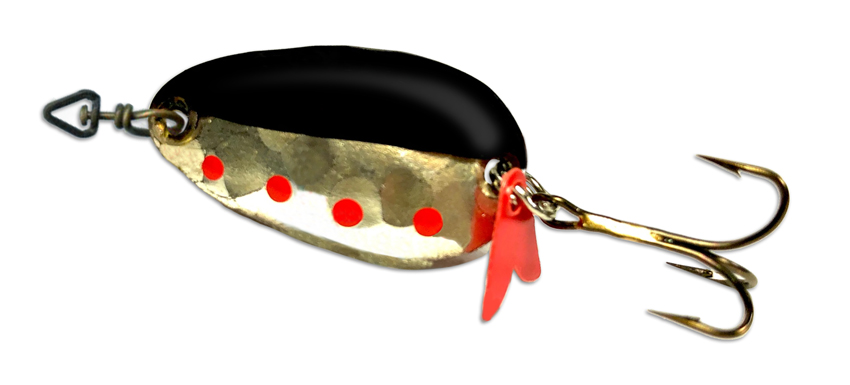
Ang’s favourite EGB Spoons for opening day Brook Trout
Angler – Ray Kohlruss (Alberta fishing guide): SPECIES NORTHERN PIKE:
Ray has been fishing Alberta waters ever since childhood. With over 40 years of fishing experience in the area, Ray brings his knowledge and excitement to each fishing trip. He likes to practice catch and release and treats all fish with great care when releasing. Fish’n Canada has worked with Ray on numerous occasions, and we’ll attest to his guiding abilities.
#07 Ray’s Opening Day Pike Tip:
Here in Alberta when fishing Northern Pike early season, I will look for bays that are in prime post-spawn areas where the water temperature is warmer than the rest of the lake. A water temperature sensor on your fishfinders transducer is a must. A few degrees can make a huge difference. The Pike here can sometimes be tight to the shore in only 1 foot of water. Anglers need to cover the entire area… many of my clients are surprised as to just how shallow these recovering beasts are!
Bait choices can vary, a person can start with medium size lure, and upsize or downsize if needed. Casting spoons and soft plastics has always been a favourite of mine. ALWAYS use a leader!
Happy fishing

A spoon is always a great choice when Pike fishing… and of course red & white is a go-to colour!
ANGLER – RYAN FLARO (Ontario Fishing Guide), species WALLEYE:
Ryan lives along the shores of the St Lawrence River near Lancaster Ontario. He has spent pretty much his entire life is this area and during that time, he has fished the St Lawrence and in particular Lake St Francis (the actual name of the waterbody he lives on) almost daily. That equals years of experience. Although Ryan will fish for other species, it’s the Walleye that keeps him sharp from spring until fall. His take on opening day “Franny” Walleye is an interesting one.
#08 Ryan’s Opening Day Walleye Tip:
One early-season pattern I have on Franny is, once the fish finish spawning, they immediately drop into the deepest holes in the river. The closer that hole is to the spawning grounds, the better that hole will be. I use my Garmin/Navionics chart to find the area and then switch over to Panoptix. There are so many fish in some of these holes that you screen comes alive.
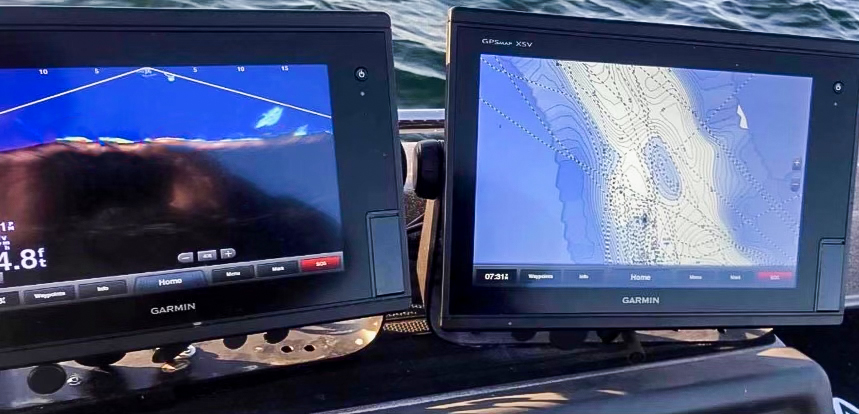
The left unit shows Walleye on the bottom in Panoptix mode, the right unit shows what one of these deep holes looks like on a contour map.
My technique is to vertically work a Dropshot Rig (normally used by Smallmouth anglers) with a nose-hooked plastic bait like a Megabass Hazedong, right in the school. It normally does not take long to get a bite. These fish are aggressive.

A nose-hooked plastic like this one does the trick on early Walleye for Ryan.
I’ll give you Fish’n Canada readers something to chew on here. I have discovered that many of these Walleye are “full” of small Lamprey. I know it for a fact because of two reasons. First, I love a feed of Walleye, so I examine the stomach contents of the fish I catch. Secondly, these Walleye are literally spitting out Lamprey into my boat when I catch them.
How’s that for invasive species control!
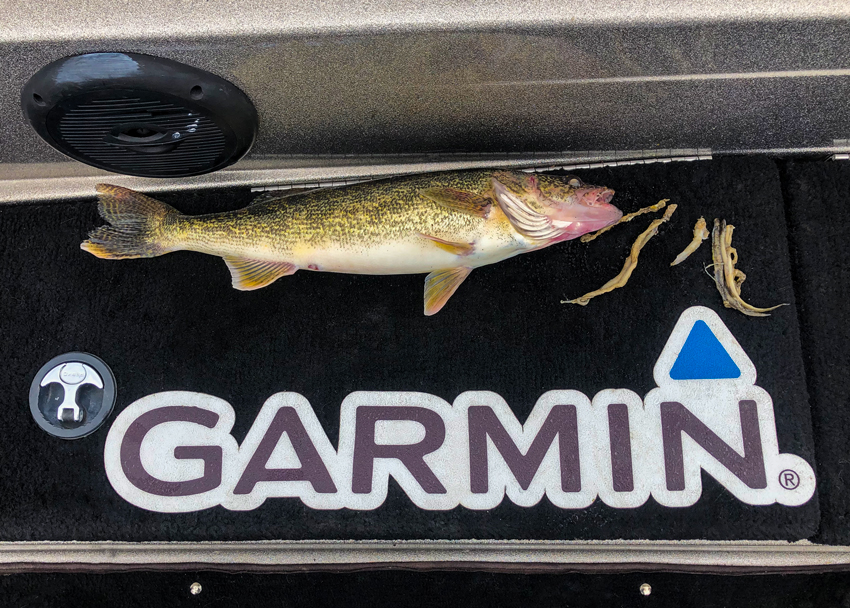
Figuring out what the fish are eating and contributing to a fish fry… multi-tasking!
ANGLER – GORD PYZER, species MUSKIE:
Gord is widely regarded as Canada’s most scientific angler. Ang and I call him “The Doc” because of his vast amount of knowledge in our world. He worked for 30 years as a senior manager with Ontario’s Ministry of Natural Resources before devoting all his energies to fishing. A member of the Canadian Angler Hall of Fame, Canadian Outdoor Hall of Fame, National Freshwater Fishing Hall of Fame, Outdoor Canada’s fishing editor, Field Editor for In-Fisherman Magazine, Television and Radio, Cabela’s Canada Fishing Ambassador and President of Canadian Angling Adventures Ltd., Gord’s resume is as full as it gets in the fishing business.
You can listen to Gord on the Outdoor Journal Radio section of our website where he and Ang spent a countless amount of time talking fishing.
#09 Gord’s Opening Day Muskie Tip: Few lures have revolutionized muskie fishing more than giant #10 double bladed inline spinners. But on Opening Day, I never leave the dock without a white Mepps Muskie Killer tied on at least one rod. It has long been one of my “go to” Opening Day baits because it has a smaller single blade that I can retrieve much more quickly than the bigger double 10s. My favourite pattern is to fish trees that have toppled into the water along shore, near likely muskie spawning areas. After they lay their eggs, the big girls hide around the flooded stumps and branches and pounce on passing by baitfish. If you throw a big #10 double bladed spinner, however, it grabs so much water that you can’t burn it fast enough to super excite the fish. Pitch in a Mepps Muskie Killer, on the other hand, bulge it quickly just under the surface and hang on.
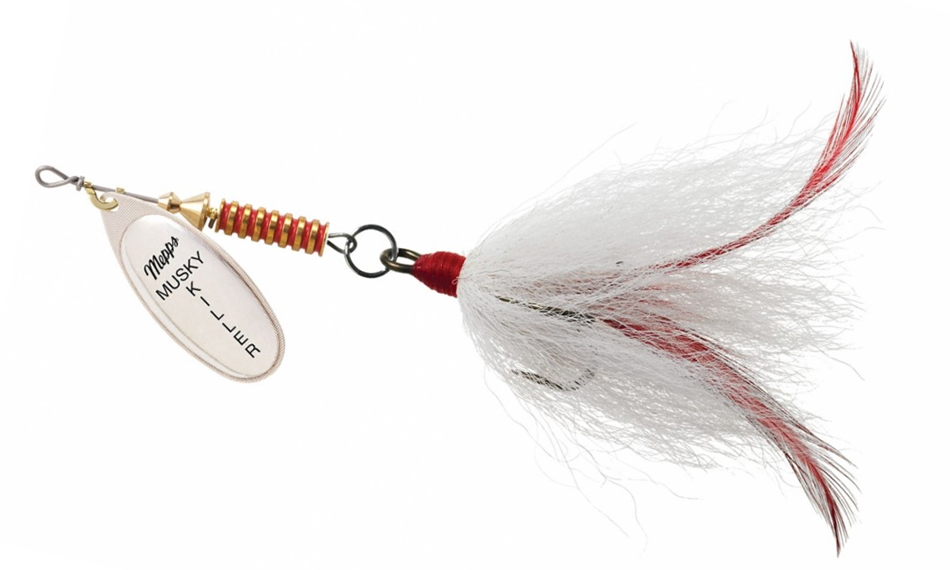
The classic Mepps Muskie Killer… an opening day go-to for Gord Pyzer.
ANGLER – STEVE NIEDZWIECKI, species MUSKIE:
Steve is the former owner of Chaudiere Lodge on the upper French River, so he has seen his share of big Muskie. Although Steve’s “on the water” time was somewhat limited, since his managing the lodge duties were first and foremost (he did fish whenever he could), Steve stayed in close contact with all his fishing guides… Muskie specialists included. His opening day pattern is a consistent one that produces big fish early in the season.
#10 Steve’s Opening Day Muskie Tip:
What typically happens on the French is that Muskie will move into spawning areas and once done, many of the big fish immediately start to head out or “migrate” towards their summer areas. That may be Lake Nipissing, or it may be somewhere in the river itself…doesn’t matter, the pattern is pretty much always the same. That migration is the key.
Take Satchels Bay for instance. It is one of the most popular Muskie spawning bays on the upper French. Satchels has two entry and exit points (a main one and a secondary one) for fish to come in to, and more importantly, leave from. Once the big Satchel fish get on their high-horses and start to get outta’ Dodge, I feel they use the bottom contours or breaklines and their guidance paths. I’m not saying they don’t swim across open water with relatively little structure below, however since a lot of the baitfish are using the breaklines at this time, this now becomes a migration as well as a feeding path. It also gives Muskie anglers a guideline to follow vs. completely open barren water. This is especially important.
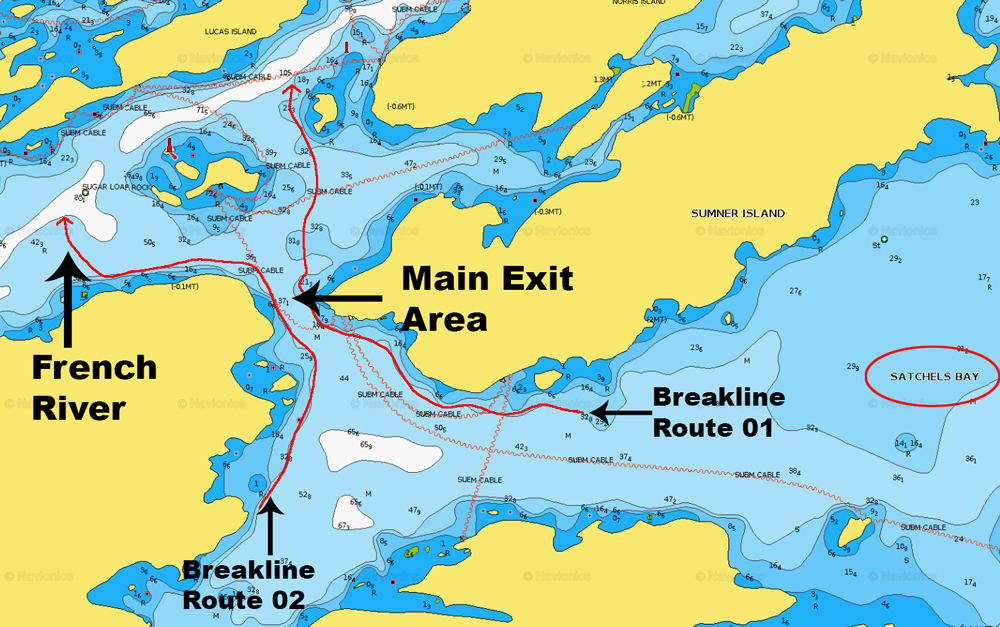
Here is a prime Muskie spawning area on the upper French River, the red lines indicate our trolling runs.
We fish these routes by trolling crankbaits down, up, over, and along until we see fish on our screens, bait on our screens or when a rod buckles over in the holder.
A good contour map like a Navionics chart is a must, along with a depth finder to keep you near the breaks.
Here is my personal tip or trick. I troll about 2.5mph (which is considered slow for Muskie in summer and fall) and often downsize my baits to something like an 8” straight Believer with no rattles. These fish are still recovering so I want to make things as simple and easy as possible for them.
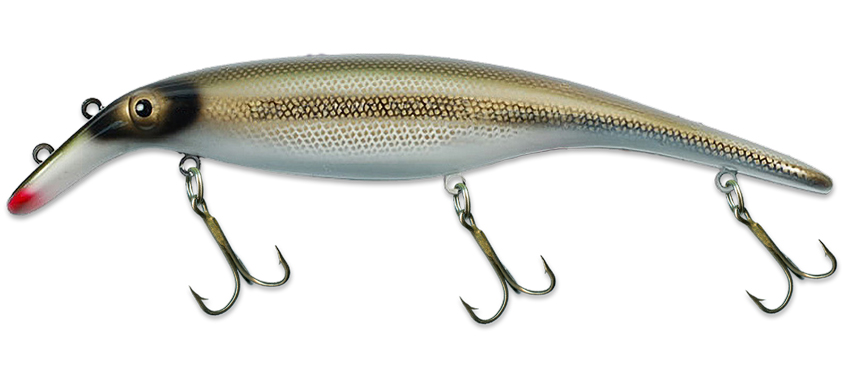
Troll this sweet baby along breaklines that connect to Muskie spawning areas and hang on!
CONCLUSION
Well, I hope you liked, and more importantly got some solid info from any or all the above pieces. I believe this group of fishing pals that I have accumulated here are some of the greatest minds in the business. Some, like Angelo and Gord, have built great fame in the fishing world. Steve has lived at both ends of the spectrum by co-hosting on the Fish’n Canada show as well as done some professional guiding. And lastly, guys like Ryan and Ray, have literally guided hundreds upon hundreds of clients to fantastic days on the water. Take it from me, it is essential to be “all ears” when knowledge about fishing is in the air. I still try and learn something new about this great sport every day of my life. Best of luck on your next opening day & into the early season, no matter what species you are after.
https://fishncanada.com/top-10-opening-day-and-beyond-fishing-tactics-you-need-to-know/
 CampingSurvivalistHuntingFishingExploringHikingPrivacy PolicyTerms And Conditions
CampingSurvivalistHuntingFishingExploringHikingPrivacy PolicyTerms And Conditions
